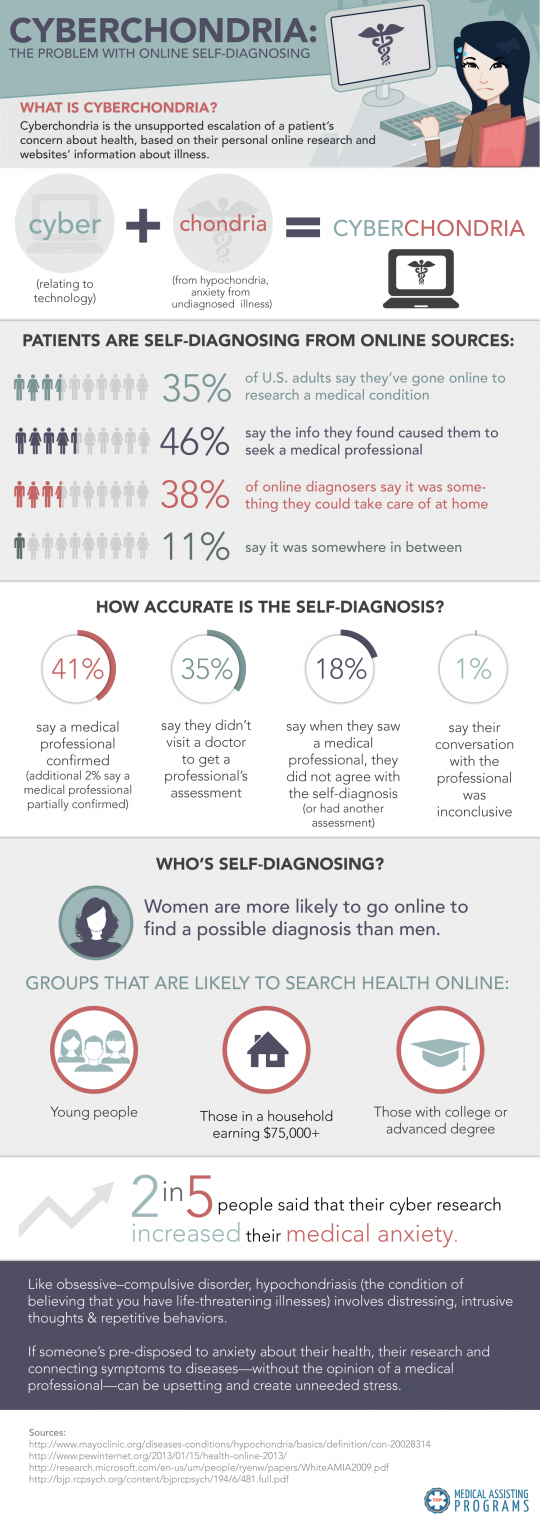 Cyberchondria is the unsubstantiated escalation of a patient’s concern about health, based on their personal online research and websites’ information about illnesses. The word comes from a combination of cyber-, to indicate technology, and -chondriac, from hypochondriac, which is an anxiety from believing you have a serious illness without having your symptoms diagnosed by a doctor.
Cyberchondria is the unsubstantiated escalation of a patient’s concern about health, based on their personal online research and websites’ information about illnesses. The word comes from a combination of cyber-, to indicate technology, and -chondriac, from hypochondriac, which is an anxiety from believing you have a serious illness without having your symptoms diagnosed by a doctor.
Cyberchondria can be simply a temporary neurosis that only lasts until a patient musters up the courage to visit the doctor. But cyberchondria is a growing concern for healthcare practitioners since patients are taking the liberty to connect their symptoms to serious illnesses and diseases from information on the internet—information that can be created, posted, and altered on the internet by virtually anyone.
Do You Have Cyberchondria?
Chances are you might have had some symptoms or health concerns, and turned to the internet for answers, since 35% of adults in America have said they have gone online to research a medical condition. But 46% said that the information they found was troubling enough to cause them to seek a medical professional’s opinion and 38% of online self-diagnosers (those who connected their symptoms with a cause from their online research) said that it was a cause that they could remedy at home.
Women are reported to be the biggest culprits of searching for possible self-diagnosis online, and more specific groups of people that studies show are likely to self-diagnose are young people and those people who have earned a college or advanced degree. The really puzzling demographic of people who are likely to search medical diagnoses online is households that annually earn $75,000 or more—it can be surmised that this stems from an investigative curiosity or anxiety that motivates them to research rather than not being able to afford the cost of a visit to the doctor.
What Now…
Whatever the reason someone chooses to do medical research online before seeing a doctor, cyberchondria can cause a number of problems for physicians. Besides cyberchondria causing an unneeded stress about an illness that patients might not even have, patients who visit a medical professional after doing their research might disagree or argue with the doctor’s professional opinion, choosing instead to believe what they’ve read online. The most serious consequence of self-diagnosing is that a patient could search for their symptoms online, find a non-threatening explanation, and defer seeking a medical professional’s care while a serious or life-threatening illness goes untreated.
Humans are curious beings, so it is natural to want to use an abundant resource such as the internet to find out what is causing an ache, pain, sting, or itch. However, when it comes to a symptom that causes you enough concern to research it, bring your research and hypothesis to your doctor and trust her or his professional assessment about whatever it is that ails you.

